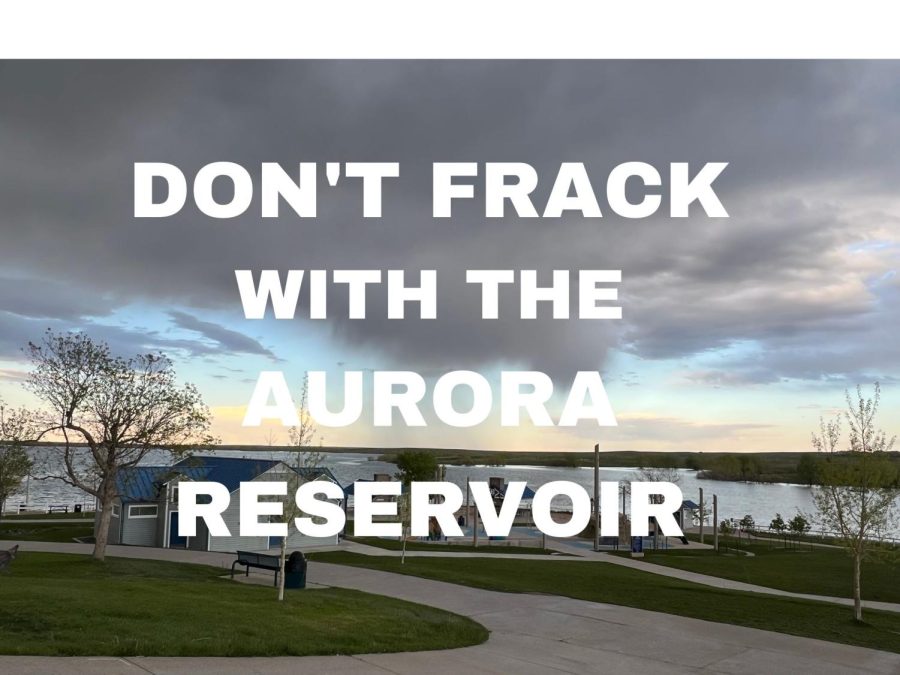South Shore Residents respond to neighborhood fracking projects
May 16, 2023
Driving through many neighborhoods, signs, and decorations are prevalent in front yards; however, driving through the Southshore community one sign stands out among the rest: a sign saying “Don’t Frack with Aurora.”
Fracking or hydraulic fracturing is the process of drilling horizontally and vertically beneath surface level, then injecting water and sand alongside different types of fluids which do not necessarily have to be disclosed. The goal of this process is to crack open rocks using high amounts of pressure and then extract fossil fuel and natural gas. Then the gas is used to warm homes, operate power plants, and utilized gas stations.
Civitas, one of Colorado’s leading gas and oil companies, has been around for over two decades. Civitas plans to start up The Lowry Ranch Comprehensive Area Plan (CAP) during the second quarter of 2024 and drilling is expected to end in 2029. According to the City of Aurora, Civitas plans to build up to 174 wells outside the city limits of Aurora on the adjacent side of the Aurora Reservoir on up to 25,000 acres of land. The minerals and natural gas however will be extracted from the areas within residential Aurora.
A group of worried neighbors in Southeast Aurora has united, forming a group known as “Save the Aurora Reservoir” to demonstrate their opposition to this new proposal. Tisha Foard is one of the concerned residents of the Southshore community and an English teacher at Cherokee Trail. “I think many families and kids would be pretty upset to find out that this was happening right underneath our school building,” said Foard.
The process of fracking has proven to be more cost-effective in mining for oils and natural gases which has contributed to a decline in gas prices in previous years. Mark Davidson, a retired Software engineer, and Project Manager, is also a member of the “Save the Aurora Reservoir” group. He says that “It is difficult to say that the goods outweigh the risk” in terms of fracking.
In the state of Colorado, “We are a net exporter. We export from this state as opposed to importing,” said Davidson. Although there is a possibility that the gas in nearby pumps could one day be from right here in Aurora, it is very unlikely.
Typically, when residents purchase homes in urban or suburban areas, they usually only purchase the surface rights of the land but do not own the rights to the minerals underneath the property. In the past, not owning mineral rights was not an issue for urban communities. As urbanization continues to expand, so does the demand for energy, leading to the integration of fracking within densely populated areas.
In order for drilling operations to begin, Civitas would first have to acquire 45% of the mineral rights of the land they intend to operate under.
“Neither the city or county disclosed that they’d already leased the land on the other side of the reservoir to oil and gas,” said Foard. Many residents of the area were under the impression that the land near homes would never be built on and was under protection because of its close proximity to the Lowry Superfund site, a former military bombing range that still houses hazardous deposits.
Civitas proposed installing pipes under the Superfund site to extract oil and natural gas, a proposal to which many inhabitants of the nearby communities have opposed. “The Superfund has leaked in the past,” said Nancy Wuzman, an assistant speech and debate coach at Cherokee Trail and a Southshore resident.
“I feel like they are risking the lives of the residents and wildlife, which is the main reason many people moved to Southshore in the first place,” said Dallas Wilkerson, a sophomore at Cherokee Trail. “There’s no guarantee that a mistake won’t be made along the way. There’s always a possibility for human error.”
According to research, individuals who reside near fracking sites are more likely to experience an increased risk of health issues such as childhood leukemia, reduction in fetal growth, cardiovascular disease, and respiratory illnesses. “My wife and I brought our forever home here,” said Davidson. He and many other residents fear the effects fracking poses on their health.
Nicole Gold, an AP Environmental teacher, said, “I think the biggest thing is to keep on asking questions.”
“We’ve already made a difference,” said Wurzman. Although the drilling is not set to begin for the next six months, residents of Aurora have continued their adamant opposition by showing up to commissioner meetings and reaching out to elected officials.





Marsha Kamin • May 23, 2023 at 5:32 pm
Please go to save-the-auora-reservoir.org to stay up to date on this development and learn how you can help keep our community safe.